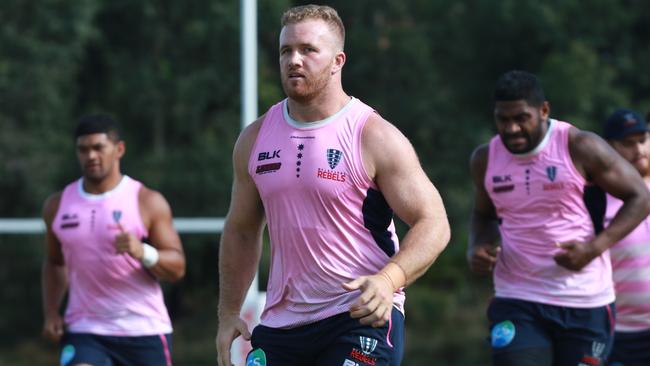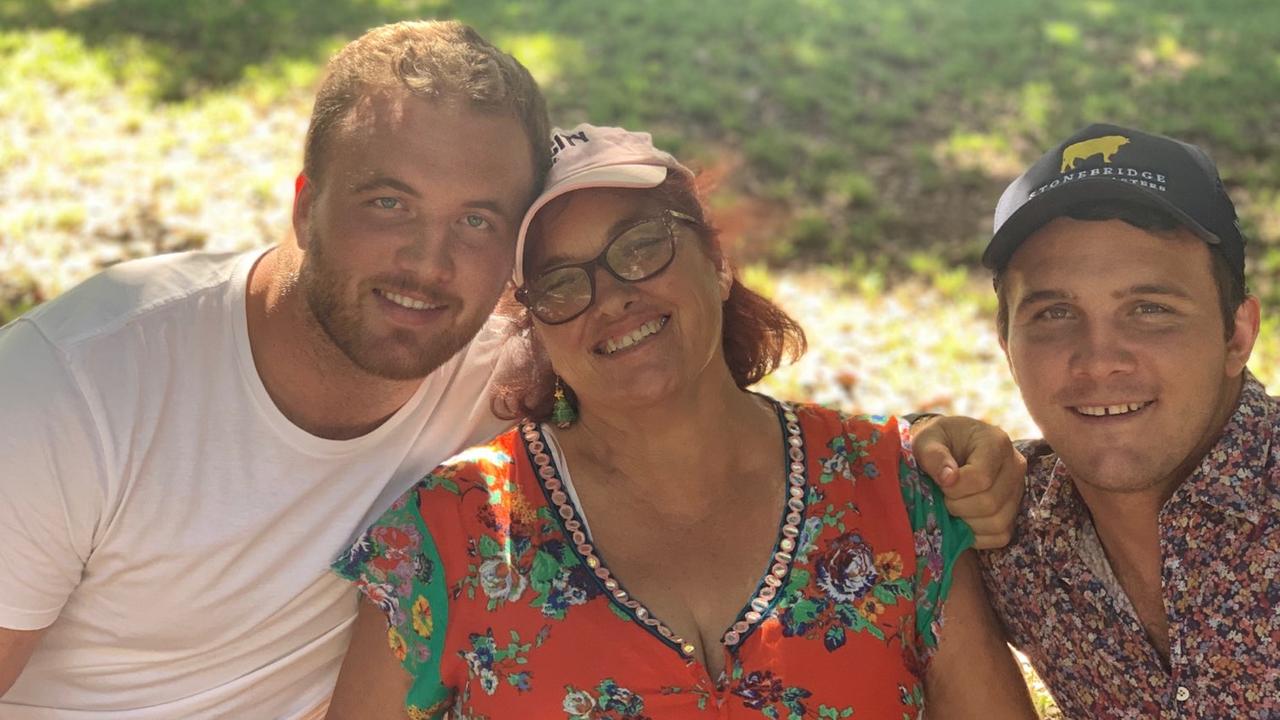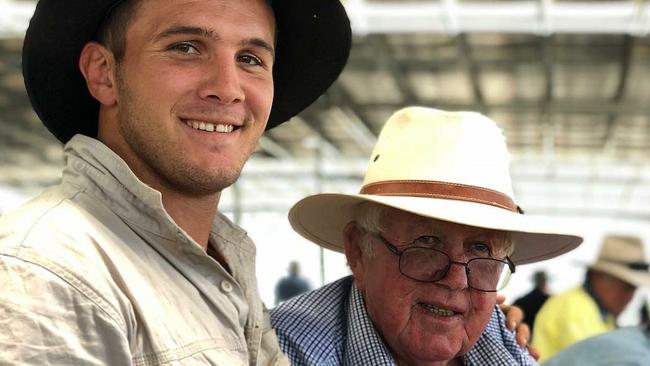Matt Gibbon explains the inspirational story behind his stunning rise at the Melbourne Rebels
Every athlete has an origin story. But there’s not many like Matt Gibbon’s tale. His stunning rise up rugby’s ranks to the Melbourne Rebels needs to be seen to be believed.

Rugby
Don't miss out on the headlines from Rugby. Followed categories will be added to My News.
Every athlete has an origin story. But there’s not many like Matt Gibbon’s tale.
The popular, affable, extremely hardworking prop has earned a new contract with the Melbourne Rebels after a 2019 Super Rugby season that included a surprise debut and training with the Wallabies squad before the World Cup.
But you have to go back further to fully grasp the significance of both those accomplishments.
Gibbon grew up in Alstonville, on the northern coast of NSW, and lived, until he was 10, with his parents who both have mental disabilities.
Watch every match of the 2020 Vodafone Super Rugby Season LIVE & On-Demand on KAYO. New to Kayo? Get your 14-day free trial & start streaming instantly >

Chrissy Pollock, his mum, and Chris Gibbon, his dad, met and fell in love at the House with No Steps, a government-run farmhouse set up for people with disabilities to work and socialise.
Chrissy was born with cerebral palsy and has the mental and emotional capacity of a 10-year-old.
Chris was in a car accident as a child and received severe brain damage.
Gibbon told the Herald Sun that his dad’s intellectual capacity was “even worse” than his mum’s.
They married and wanted to have kids but doctors advised against it.
Their own parents, however, wanted to give them an opportunity to live as normal a life as possible and signed guarantees to support the parents and to look after any children should it be required.
Two years after they married, in 1992, Chrissy gave birth to her first son, Alex.
He was happy and healthy.
Matt followed three years later. He was happy and healthy, too.
Gibbon said his mother was “amazing, always positive and very loving”, but looking after two kids was beyond his parents.
“They thought they could be responsible enough, but they just couldn’t,” Gibbon said.
DARK TIMES
He said his childhood was an unregulated environment, which was overrun with bad people — “bikies and drug addicts” — who took advantage of his parents.
“There were some pretty dark times, not great people hanging around the house. It wasn’t a great environment for kids,” Gibbon said.
“My parents were aware of every day things, but they just didn’t understand them properly.
“When you are young, you can talk to them. But when you are older, you realise the difference, and how significant it was.
“My grandparents lived on a farm nearby, too, but they couldn’t be there all the time.
“A lot of stuff happened they didn’t know about.”

Unsavoury types were at the family house so often that Gibbon and his older brother would need to get away to avoid being beaten.
The pair would wander the streets at night, not wanting to go home, and fell in to bad behaviour themselves.
“My brother and I did some bad things, hung out with bad people,” Gibbon said.
“No one would tell us ‘no’. We really just did what we wanted, we just thought that was normal.”
Gibbon conceded the pair could have fallen in to a life of crime, if not for a significant moment, which shaped their futures for the better.
“When I was about 10, my grandfather, mum’s dad, came and got us and took us to the farm to live,” Gibbon said.
“My dad was getting pretty bad, he was up to a few things, so we left him.”
WORK AND RUGBY
Grandad Dave Pollock was a no-nonsense country bloke. He ran a farm with cattle and a “little bit of everything”.
He had played rugby and had already steered both Matt and Alex to the sport.
He also put them to work. “I’d be up in the morning milking a cow or there’d be one loose on the road I’d have to go get it and then I’d go to school. It was much more stable,” Gibbon said.
“My grandfather was my first rugby coach, too. He used to make us run at training, and one time we just said we wouldn’t run, and he said ‘OK’ and walked off to his car. He came back with a stock whip and cracked it a few times. You should have seen us run.”
It was Alex who showed the most rugby promise early.

He was named NSW country player of the year in 2009 and was offered a scholarship to St Josephs Nudgee College in Queensland, a rugby factory.
Gibbon noticed the immediate impact moving to such a different environment had on his brother.
“When we were young, in those early days, we wouldn’t go a day without fighting each other. But the last time we fought was the day before he went to Nudgee. He came back a gentleman,” Gibbon said.
He followed his brother, who played Rugby Sevens for Australia, to the boarding school on his own scholarship.
Gibbon also embraced the positive environment.
“It’s the people you are with, the people you are around. I could get away with so much when I was a kid, and I did,” Gibbon said.
“We had to get out of that environment and that’s what rugby did, it brought us out of that darkness.

“Instead of hanging around people who weren’t great, we were around good people doing good things, and when you do that it’s not hard to change.
“More than rugby, they teach you how to be a good human being.”
It’s a character trait anyone who knows Gibbon recognises in him — and one he gets from his mum, who remains a solid rock for the 25-year-old.
“She is an amazing woman, always happy, always supportive and rings or messages me every day. She’s very loving,” Gibbon said.
Hard work is also a cornerstone of Gibbon’s professional life.
MORE RUGBY
Super Rugby 2020: Queensland Reds’ Jordan Petaia suffers season-ending shoulder injury
Andrew Slack on the problem of dead time in rugby and how to fix it
Super Rugby 2020: O’Connor’s Reds shift could solve Wallabies problem
He is a qualified electrician and happily took a “massive” pay cut when he headed to Melbourne for a pre-season trial he thought was over last January.
But a word to the football manager to ask about flights home and a return to Sydney club rugby ended with the suggestion he hang around.
Rebels coach Dave Wessels loved what Gibbon produced, played him in every game last season and he’s now a front row fixture.
Life rarely follows a straight line and Gibbon’s path has had its share of twists and turns. But he’s got to where he wanted to be.


